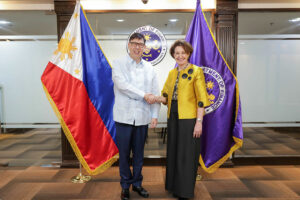ECONOMIC MANAGERS expect ties between the Philippines and US to remain strong amid the Trump administration’s tariffs threats.
“Generally, we see that the strong economic and investment ties between the Philippines and the US will remain,” Finance Secretary Ralph G. Recto told BusinessWorld in a Viber message on Feb. 18.
Economic managers held their monthly meeting on Monday, where they discussed current macroeconomic and trade policies, including those announced by the US.
Other officials who attended the meeting include Trade Secretary Ma. Cristina Aldeguer-Roque, Office of the Special Assistant to the President for Investment and Economic Affairs Secretary Frederick D. Go, Budget Secretary Amenah F. Pangandaman, and National Economic and Development Authority Secretary Arsenio M. Balisacan.
“The economic managers discussed how we can capitalize on implementation of the Corporate Recovery and Tax Incentives for Enterprises to Maximize Opportunities for Reinvigorating the Economy (CREATE MORE) Act,” Mr. Recto added.
Mr. Recto and Ms. Roque signed the implementing rules and regulations (IRR) of CREATE MORE.
President Ferdinand R. Marcos, Jr. last November signed into law the CREATE MORE Act, which seeks to make the country more competitive and attractive to investors.
Meanwhile, Mr. Recto also recently met with US Ambassador to the Philippines MaryKay L. Carlson to advance trade and investment ties between the two countries “in line with the new Trump administration policies.”
“Ambassador Carlson reaffirmed that the countries’ bilateral trade relationship is in a good position and is aligned with the US’ prosperity agenda,” the Department of Finance (DoF) said in a Facebook post.
Ms. Carlson also noted the US investors’ “bullishness” towards the Philippines, particularly on the planned Luzon Economic Corridor and other high-value industries such as semiconductor and manufacturing supply chains.
“The Finance chief also highlighted the alignment of the country’s economic and development priorities with the foreign policy of the Trump administration,” the DoF said.
US President Donald J. Trump on Wednesday threatened a 25% tariff on automobiles, pharmaceuticals, and semiconductor imports, with an announcement expected as early as April 2.
He is also eyeing to impose reciprocal tariffs on countries that tax US imports, which raised concerns of a broader trade war.
The Philippines’ semiconductor industry may face lower demand if Mr. Trump pushes through with the plan to impose 25% tariffs on semiconductor imports.
“Philippines is at risk of losing demand for its semiconductor products especially as the US being one of our biggest trading partners for these products,” Oikonomia Advisory and Research, Inc. economist Reinielle Matt M. Erece said.
The US remained the top destination for Philippine-made goods in 2024, with exports valued at $12.12 billion representing 16.6% of total export sales.
Electronics exports slumped last year as global demand remained soft. Electronic products, which made up more than half of all exports, dropped by 6.7% to $39.08 billion in 2024. Semiconductors also fell by 13.5% to $29.16 billion in 2024.
“But these things will not happen instantly, as the US will need time to develop their own semiconductor industry. In the meantime, they will have to accept the additional tariffs and still look into importing these from foreign producers such as the Philippines,” he said.
Mr. Erece said it is crucial for the Philippines to further develop the semiconductor industry to become more globally competitive.
“It is important to still develop this key industry to produce it more efficiently and gain an advantage in the global marketplace, as well as in diversifying its portfolio of trading partners to ensure demand stability and competitive edge through FTAs (free trade agreements) and other preferential trading contracts,” he said.
The Philippines is pushing for a bilateral FTA with the US. It is also currently negotiating an FTA with the European Union.
Rizal Commercial Banking Corp. Chief Economist Michael L. Ricafort warned that higher US import tariffs could slow international trade between the long-standing allies.
“This would adversely affect the biggest Philippine exports to the US such as electronic products ignition wiring sets; other manufactured goods; coconut oil; machinery and transport equipment; among others,” he said.
Mr. Ricafort also pointed out that reciprocal tariffs would make Philippine exports to the US more expensive. — Aubrey Rose A. Inosante
